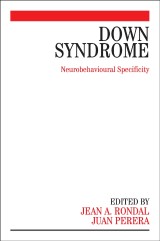Details

Down Syndrome
Neurobehavioural Specificity1. Aufl.
|
56,99 € |
|
| Verlag: | Wiley |
| Format: | |
| Veröffentl.: | 04.08.2006 |
| ISBN/EAN: | 9780470029091 |
| Sprache: | englisch |
| Anzahl Seiten: | 234 |
DRM-geschütztes eBook, Sie benötigen z.B. Adobe Digital Editions und eine Adobe ID zum Lesen.
Beschreibungen
People with Down Syndrome show a specific developmental profile with strengths in social understanding and visual learning and memory, and more difficulties with motor processes, speech and language, and auditory-vocal short-term memory. It is important that parents, practitioners and teachers know this and adapt interventions and educational approaches to take account of this particular profile. <p>This is the only book to date that explains the developmental profile of people with Down Syndrome from its many different angles. It covers a range of perspectives, including the biology, psychology, speech and language, health care, and social competence of both children and adults with Down Syndrome. All the information is gathered and placed in the context of the neuro-genetic science that is developing around this area.</p>
List of contributors. <p>Foreword.</p> <p>1 Specifi city in Down Syndrome: A New Therapeutic Criterion (<i>J. Perera</i>).</p> <p>2 Down Syndrome: From Pathology to Pathogenesis (<i>Krystyna E. Wisniewski, Elizabeth Kida, Adam A. Golabek, Mariusz Walus, Ausma Rabe, Sonia Palminiello, Giorgio Albertini</i>).</p> <p>3 Ageing and Susceptibility to Alzheimer’s Disease in Down Syndrome (<i>David Patterson</i>).</p> <p>4 Down Syndrome Specifi city in Health Issues (<i>Alberto Rasore Quartino</i>).</p> <p>5 Neuropsychological Aspects of Down Syndrome (<i>Lynn Nadel</i>).</p> <p>6 The Contribution of Memory to the Behavioural Phenotype of Down Syndrome (<i>Darlynne A. Devenny</i>).</p> <p>7 Specifi c Language Profi les in Down Syndrome and other Genetic Syndromes of Mental Retardation (<i>Jean-Adolphe Rondal</i>).</p> <p>8 Total versus Partial Specifi city in the Behaviour of Persons with Down Syndrome (<i>Robert M. Hodapp</i>).</p> <p>9 The Emergence of a Syndrome-specifi c Personality Profi le in Young Children with Down Syndrome (<i>Deborah J. Fidler</i>).</p> <p>10 Learning Diffi culties in Down Syndrome (<i>Giovanni Maria Guazzo</i>).</p> <p>11 Off to a Good Start: Early Intervention for Infants and Young Children with Down Syndrome and their Families (<i>Donna Spiker</i>).</p> <p>12 Family Setting in Down Syndrome (<i>Salvatore Soresi, Laura Nota, Lea Ferrari</i>).</p> <p>Conclusions.</p> <p>Index.</p>
<b>Prof. Jean A. Rondal</b>, University of Liège, Belgium<br /> Prof. Rondal has studied the education of mentally retarded people for over 40 years. He has won multiple awards for his outstanding scientific research at international conferences, and taught at several universities in Europe and North America. He co-founded the European Down Syndrome Association and was president from 1997 to 2000. He is currently a member of the Directorial Board of Down Syndrome International. <p><b>Dr. Juan Perera</b>, University of the Balearic Islands, Spain<br /> Dr. Perera has attained worldwide recognition for his conferences, research and publications. A guest lecturer at several European and American universities, he has dedicated himself to isolating, studying and describing specific aspects of Down syndrome. He was president of the World Down Syndrome Congress held in Madrid in 1997. He has also been a member of the Scientific Committee for the last four world congresses and has organised six international symposiums on the different aspects of Down syndrome in Majorca.</p>
Do children and adults with Down syndrome have a specific developmental profile of strengths, weaknesses and needs on which early intervention, education, and healthcare should be based if they are to be effective? This is the key question asked in this provocative and state-of-the-art review of research. The responses come from leading specialists regarding the various aspects of Down syndrome (genetic, biological, neuropsychological, healthcare, speech and language, cognition, learning, well-being, emotional and social competence, temperament and personality, and family adaptation and parent training). <p>Experts agree that children with Down syndrome do indeed show a specific developmental profile with strengths in social understanding and visual learning and memory, and more difficulties with motor processes, speech and language, and auditory-vocal short-term memory. It is important that parents, practitioners and teachers know this and adapt interventions and educational approaches to take account of this particular profile.</p> <p>At a more fundamental level, the behavioural data regarding the specific profile of relative strengths and weaknesses in Down syndrome are being set in correspondence with the growing knowledge on neurogenetic aspects of the syndrome. This prepares the way for a fuller, neurobehavioral account of the condition and of its developmental characteristics.</p>

















